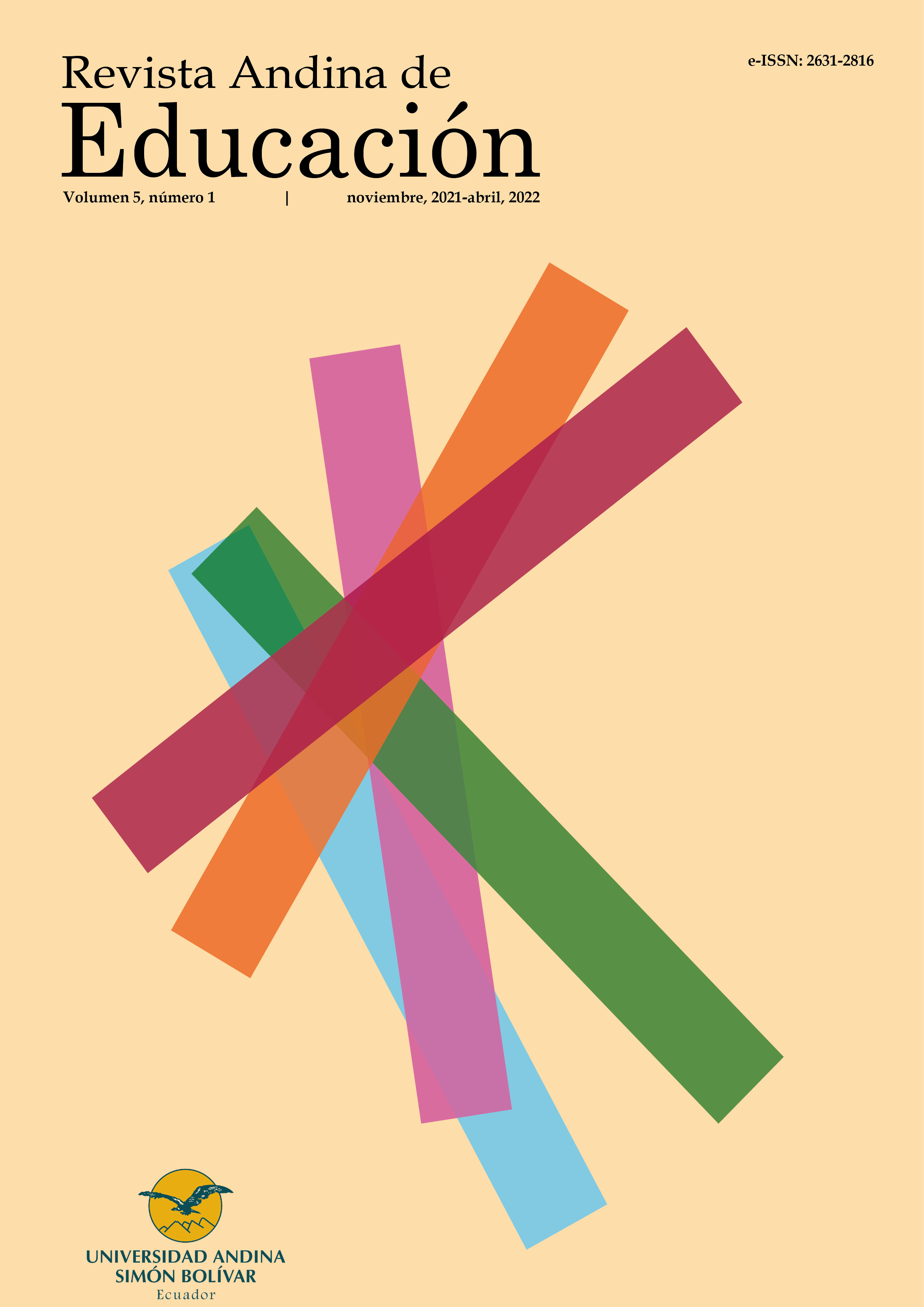Las redes sociales para fomentar la interculturalidad en la educación superior
Contenido principal del artículo
Resumen
Este artículo tiene como objetivo analizar la relación que existe entre las redes sociales y las prácticas interculturales en la educación superior. Se utilizó un enfoque cualitativo apoyado en la metodología investigación-acción y en la técnica descriptiva, con lo cual se verificó el planteamiento problemático. Como resultado se obtuvo que el uso de las redes sociales promueve la interculturalidad por sus múltiples ventajas: comunicación, interacción, facilidad de uso y participación de la comunidad educativa. Se logró incentivar la práctica de los principios interculturales y la valoración del uso de las redes sociales de forma innovadora, así como la generación de espacios en que los docentes fomenten entre los estudiantes la presencia de valores culturales en el campo educativo.
##plugins.themes.bootstrap3.displayStats.downloads##
Detalles del artículo
Sección

Esta obra está bajo una licencia internacional Creative Commons Atribución-NoComercial 4.0.
Los/as autores/as que publiquen en esta revista aceptan las siguientes condiciones:
1. Los/as autores/as conservan los derechos de autoría y ceden a la Revista Andina de Educación el derecho de la primera publicación, con el trabajo registrado con la licencia de atribución para uso no comercial de Creative Commons, que permite a terceros utilizar lo publicado siempre que mencionen la autoría del trabajo y a la primera publicación en esta revista.
2. Los/as autores/as pueden realizar otros acuerdos contractuales independientes y adicionales para la distribución no exclusiva de la versión del artículo publicado en esta revista (p. ej., incluirlo en un repositorio institucional o publicarlo en un libro) siempre que indiquen claramente que el trabajo se publicó por primera vez en la Revista Andina de Educación.
Cómo citar
Referencias
Cano, J., Ricardo, C., & Del Pozo, F. (2016). Competencia intercultural de estudiantado de educación superior: Un estudio en la Universidad del Norte (Barranquilla, Colombia). Encuentros, 14(2), 159-174. http://www.scielo.org.co/pdf/encu/v14n2/1692-5858-encu-14-02-00159.pdf
Cruz, M., Pozo, M., Andino, A., & Arias, A. (2019). Las tecnologías de la información y la comunicación (TIC) como forma investigativa interdisciplinaria con un enfoque intercultural para el proceso de formación de los estudiantes. e-Ciencias de la Información, 9(1), 3-15. https://doi.org/10.15517/eci.v1i1.33052 DOI: https://doi.org/10.15517/eci.v1i1.33052
Gómez, I., García, F., & Delgado, M. (2018). Uso de la red social Facebook como herramienta de aprendizaje en estudiantes universitarios: Estudio integrado sobre percepciones. Perspectiva Educacional, 57(1), 99-119. http://www.perspectivaeducacional.cl/index.php/peducacional/article/viewFile/645/266 DOI: https://doi.org/10.4151/07189729-Vol.57-Iss.1-Art.645
Guevara, G., Verdesoto, A., & Castro, N. (2020). Metodologías de investigación educativa (descriptivas, experimentales, participativas, y de investigación-acción). Recimundo, 4(3), 163-173. https://doi.org/10.26820/recimundo/4.(3).julio.2020.163-173 DOI: https://doi.org/10.26820/recimundo/4.(3).julio.2020.163-173
Hernández, A., & Iglesias, A. (2017). La importancia de las competencias digitales e informacionales para el desarrollo de una escuela intercultural. Interacções, 13(43), 205-232. https://doi.org/10.25755/int.12038
Krainer, A., Aguirre, D., Guerra, M., & Meiser, A. (2017). Educación superior intercultural y diálogo de saberes: El caso de la Amawtay Wasi en Ecuador. Revista de la Educación Superior, 46(184), 55-76. https://doi.org/10.1016/j.resu.2017.11.002 DOI: https://doi.org/10.1016/j.resu.2017.11.002
Kuz, A., Falco, M., & Giandini, R. (2016). Análisis de redes sociales: Un caso práctico. Computación y Sistemas, 20(1), 89-106. https://www.redalyc.org/pdf/615/61544821009.pdf DOI: https://doi.org/10.13053/cys-20-1-2321
Latorre, A. (2005). La investigación-acción: Conocer y cambiar la práctica educativa. Graó. https://www.uv.mx/rmipe/files/2019/07/La-investigacion-accion-conocer-y-cambiar-la-practica-educativa.pdf
Morales, E., Morales, X., & Ocaña, J. (2017). Las TICS en la educación intercultural. Revista Publicando, 4(11), 369-379. https://revistapublicando.org/revista/index.php/crv/article/view/531/pdf_358
Morales Zúñiga, L. (2011). Análisis de redes sociales como posibilidad teórico-metodológica para la investigación educativa. Revista Electrónica Actualidades Investigativas en Educación, 11(3), 1-15. https://www.redalyc.org/articulo.oa?id=44722178013 DOI: https://doi.org/10.15517/aie.v11i3.10224
Muñoz Sedano, A. (2000). Hacia una educación intercultural: Enfoques y modelos. Encounters on Education, 1, 81-106. https://qspace.library.queensu.ca/bitstream/handle/1974/628/sedano.pdf.18:02?sequence=1 DOI: https://doi.org/10.15572/ENCO2000.04
Rodríguez, J. (2017). La digiculturalidad y la enseñanza de español para extranjeros: Una experiencia didáctica para la interacción oral y la interculturalidad. En R. Roig Vila (coord.), Investigación en docencia universitaria: Diseñando el futuro a partir de la innovación educativa (pp. 723-732). Octaedro. https://dialnet.unirioja.es/servlet/articulo?codigo=6180755
Schenke, E., & Pérez, M. (2018). Un abordaje teórico de la investigación cualitativa como enfoque metodológico. ACTA Geográfica, Boa Vista, 12(30), 227-233. https://revista.ufrr.br/actageo/article/view/5201 DOI: https://doi.org/10.18227/2177-4307.acta.v12i30.5201
Tello, E. (2007). Las tecnologías de la información y comunicaciones (TIC) y la brecha digital: Su impacto en la sociedad de México. Revista de Universidad y Sociedad del Conocimiento, 4(2), 1-8. https://www.redalyc.org/pdf/780/78011231006.pdf


